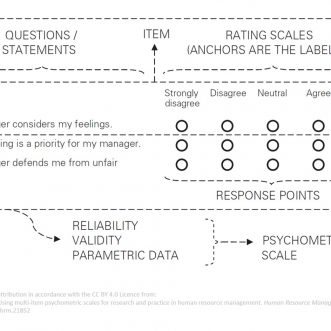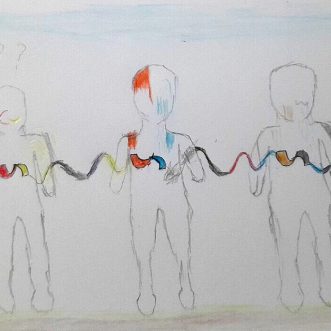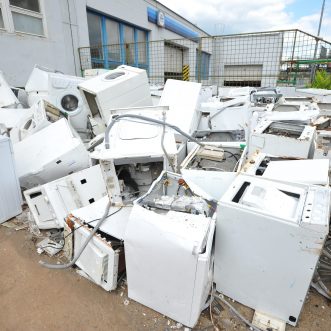
Category: Humanity


Reification
Humans are very good at taking ideas or feelings that are abstract, implicit, unexpressed, and possibly inexpressible, and giving them a concrete form, so that we can reason about them as if they have a real physical presence.
We do it all the time, with maps; forms; questionnaires, diagrams; musical scores; plans; and especially software. Those familiar icons on your phone or laptop screen are reifications of the idea of a dustbin, or a filing system, just as the original dustbin was a reification of the idea of ‘a place to collect rubbish’.
This is OK when we know that we are doing it. When we look at a map, we know it isn’t the territory. But when we give the map a voice that tells us where to go next, we forget that it is a map, and treat it as if it is real – more real than the territory.
But the most dangerous thing about this aspect of reification is that some ideas and feelings are possibly inexpressible, which means that in order to capture them, we must simplify them, reduce them, lose nuance – lose meaning.
We’ve all filled in questionnaires, for serious purposes or for fun, where some of the answers don’t really fit with our experience. But we have to choose one, so we go with an answer that is the nearest, or which captures one aspect of it. By the time everyone does that, the people who formulated the questionnaire have created a model of the group of questionnaire answerers that in fact does not capture the reality at all.
That’s fine if it was just for fun, but what if that model is then used to build the ‘systems’ (not necessarily software) and institutions that surround us? It becomes the reality, and woe betide you if you don’t quite fit.
So, it’s important to be aware that the map is not the territory. The way we model the world around us is not the world, and other models are available – even if we haven’t dreamed them up yet.
And, I think, its important to leave inexpressible things unexpressed. Some parts of the score should be left to the imagination of the musician. They’re usually the most memorable parts of each performance.

Learned carelessness
Here’s a scary thought. When their satnav says there is a road, but all they can see is water, drivers will believe the satnav, rather than their own eyes, and end up having to be rescued.
Luckily, most of the time the results of such satnav errors are not drastic – they simply start the conversation after a late arrival – “You won’t believe where the satnav took us!”
But the phenomenon behind these stories – automation bias or “learned carelessness” – is a serious problem. Confronted with a ‘black box’, whose workings we don’t understand, and which seems on the whole to be reliable, we humans switch off, stop monitoring, and stop thinking. “Computer says no.”
There are ways to prevent this.
You can de-mystify the ‘black box’, so people understand that it is part of a system designed and built by humans to achieve certain ends; you can frame the information provided by the system as support or advice rather than instruction, and you can engage the human brain by making the human do some of the work – especially where there are other humans involved.
Automation is great, but I want the best of both worlds.
Thanks to James Bridle for sparking this one.

Why do I need process if I have good people? Emotion.
Most modern businesses, large and small, involve interactions of some kind – with other employees, customers, and suppliers.
These interactions require emotional labour – listening; empathising, being present to the other person as well as intellectual labour – pattern-matching, imagining potential scenarios, reviewing possible solutions etc..
Without a process interactions become harder than they need to be, because every interaction is treated as unique, where in fact they fall into common patterns, with unique features.
Process captures what has to happen in the common patterns, giving your people a framework to work from that doesn’t need much thinking about.
Process frees up intellectual and emotional energy to be spent on the unique and personal aspects of regular interactions, and on the exceptions that either prove the rule, or highlight the start of a new pattern.
With their heads cleared of the routine, your good people can use their hearts to exceed your promises.

Spoiled
We bought a new sofa on Saturday. We visited the Soho showroom and spent a good hour or so trying various models out, measuring them, discussing how we would get them into the room, and then ordered one.
We were helped by a very pleasant assistant who took us through creating an account so we could track our order, then placing the order for the sofa we wanted. All this was done via a large tablet – so essentially, we could have been anywhere – except that we got to print a postcard of our sofa, so we could look at it while we waited the 14 weeks for delivery.
All good. We left the showroom and went off to have a celebratory pint and a proper sit-down in the pub across the road.
That’s when they spoiled it.
The first thing I saw when I looked at my phone was an email from the sofa company, triggered by creating the account: “£10 off your first purchase with this code.”, followed by another email “Thank you for your order.”
Now, I am very happy with the sofa I’ve ordered, I liked the showroom experience, and found every person we spoke to extremely helpful. And £10 is no big deal given the price of the sofa.
But still I felt cheated. Because the way ordering worked in the showroom meant I couldn’t see that discount offer until it was too late. Better then, not to have made it, or to have applied it automatically.
As the money being poured into emotional AI shows, companies are very aware that humans are feeling beings, who can easily shift and be shifted between emotions.
It would be a pity for all that money to be thrown into making promises, not at keeping them.

Accumulations
The driving force of capitalism is, unsurprisingly, the accumulation of capital.
Other things are accumulated along the way – some good (knowledge, skills, lives enhanced), some bad (waste, pollution, obesity, lives diminished, extinctions).
We’ve got really good at measuring the capital pile, but as individual businesses, we rarely look at the others. As a result we underestimate our impact on the world.
Time to account for more than profit.

Potting
It’s very satisfying to try out your idea for a pot, refining with each attempt until you come up with a version you are happy with. But what about reproducing that time after time exactly, in the quantities required to make profit?
To make a living, potters have to choose between two poles – to be an ‘artist’ commanding high prices for one-off pieces, or become a ‘manufacturer’, getting other people to churn out copies of their original by the thousand, competing with even bigger manufacturers to reach a mass market.
Studio potteries are the mid-point many have found.
Small runs of standard wares in standard glazes are produced by the potter and their team, with enough variation in the form and glazes to satisfy maker and purchaser. One-off pieces can behave more like art and give scope for exploration of ideas that keep the pottery style current.
That seems like a sweet spot in which to sit, and it doesn’t have to be small.

User-centric
The Shakers knew that people wouldn’t be able to resist chair-tilting, so they invented a mechanism that would make it safe for the chair and for the person.
They also made their chairs beautiful.
That’s what I call user-centric design.

Rest
For at least the last 189 years, we’ve known that overburdening people, equipment and systems leads to mistakes, wasted effort and sometimes, tragedy. We know that people, systems and even equipment need rest. Time out to repair, recharge and recalibrate.
In the past, days off work were imposed by law – admittedly not so people could rest, but so they could observe religious holy days, but at least they were guaranteed non-working days for almost everyone.
That is no longer the case. Now that consumerism is the national religion and online shopping never stops, we are individually responsible for making sure we take rest days. And the vestiges of our national holidays make that a bit easier to achieve.
So, this is my reminder to have a break. From work, from shopping, from the day-to-day.
Enjoy the long weekend.
See you Tuesday.

Reconstruction
It will be rebuilt.
It’s a disaster, but it’s also an opportunity to create a story worth remembering about community, craftmanship and caring. One more layer in this palimpsest of Parisian, French and human culture.
If only we felt the same for every building that burns.